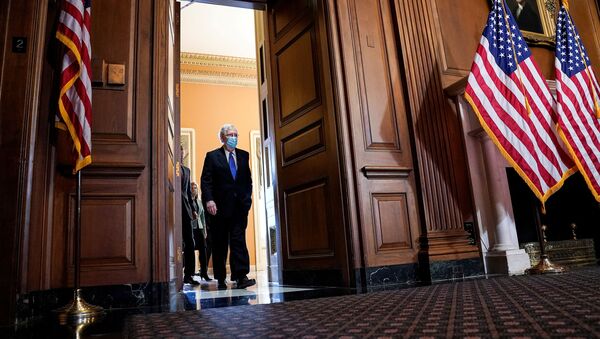As debate raged in the US Senate on Tuesday, Majority Leader Mitch McConnell (R-KY) rejected pleas for a quick vote on adding Trump’s proposed changes.
Senate Minority Leader Chuck Schumer (D-NY) and Sen. Bernie Sanders (I-VT) both urged a quick, unanimous consent vote on Trump’s requested increase of COVID-19 relief payments to families from $600 to $2,000, but McConnell rejected the move, giving an ambiguous answer on whether the issue would even get a vote.
Noting the president "would like further direct financial support for American households” as well as an amendment removing Section 230 of the 1996 Telecommunications Act and a probe of the November 3 election Trump still has not conceded to having lost, McConnell said, "This week, the Senate will begin a process to bring these three priorities into focus.”
Unless Republicans have a death wish, and it is also the right thing to do, they must approve the $2000 payments ASAP. $600 IS NOT ENOUGH! Also, get rid of Section 230 - Don’t let Big Tech steal our Country, and don’t let the Democrats steal the Presidential Election. Get tough! https://t.co/GMotstu7OI
— Donald J. Trump (@realDonaldTrump) December 29, 2020
Originally introduced in May as a $2.2 trillion bill, McConnell’s stern rejection of another COVID-19 stimulus measure put the effort on “pause” until Democrats re-introduced an updated version in September. However, compromise after compromise has seen the bill whittled down to $900 billion and the direct payments to Americans halved from $1,200, as happened with the first relief bill in March, to just $600.
However, McConnell’s primary concern this week is overriding Trump’s veto of another huge spending bill, the $740 billion National Defense Authorization Act (NDAA), which funds the Pentagon. He has set up a Wednesday vote on the override, which requires two-thirds of the Senate instead of a simple majority; the House of Representatives voted to override on Monday.
This week on the Senate floor Mitch McConnell wants to vote to override Trump's veto of the $740 billion defense funding bill and then head home for the New Year.
— Bernie Sanders (@BernieSanders) December 28, 2020
I'm going to object until we get a vote on legislation to provide a $2,000 direct payment to the working class.
Sanders, who voted against the NDAA on its first pass through Congress, pledged to slow down the override voting process until McConnell agreed to hold a vote on the $2,000 direct payment increase as well - a gambit that has so far failed.




